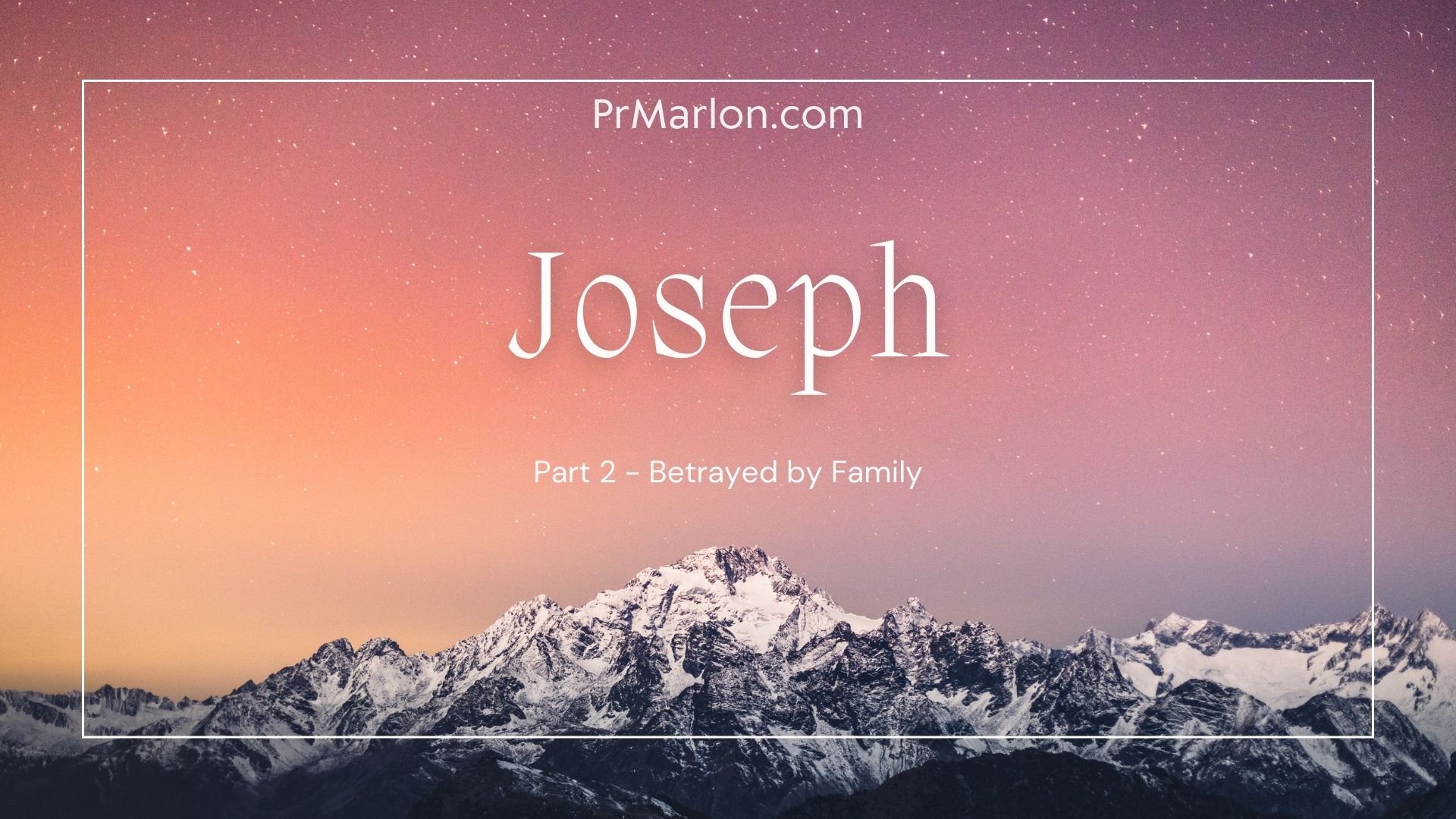Betrayed by Family
“...the greatest threat to the promises is the fractured family itself.”
The era of God’s “silence” in the patriarchal family coupled with the moral decline of the brothers, even to the depths of contemplating fratricide, signals that the greatest threat to the promises is the fractured family itself
- K. A. Mathews, Genesis 11:27–50:26, vol. 1B, The New American Commentary (Nashville: Broadman & Holman Publishers, 2005), 668.
This is part two of my Joseph series. For part one just click Dysfunctional Family.
I am a son, a brother, a husband, and a father. Yet I don’t think I fully grasp the importance of the family unit. It should come as no surprise that the family unit is under attack. I know that many get up in arms on social media about the attacks on the family. I am not judging those who choose this approach. But I believe that even more important than the articles we share on social media is the way we invest in our family. Do we prioritize the health of our family?
Spending time and effort studying the family of Jacob, especially the life of Joseph, it seems to me like when Satan wants to attack God’s plan he chooses to begin by attacking the families of God’s faithful children. This post can come across as a bit of a downer, at least this portion. But it is my prayer that this story will encourage and strengthen you as you invest in your family and make it a priority in your life.
In my previous post, we stopped at Genesis 37:11 so I’ll pick up the story with verse 12.
Go spy on your brothers?
12 Then his brothers went to feed their father’s flock in Shechem. 13 And Israel said to Joseph, “Are not your brothers feeding the flock in Shechem? Come, I will send you to them.”
So he said to him, “Here I am.”
14 Then he said to him, “Please go and see if it is well with your brothers and well with the flocks, and bring back word to me.” So he sent him out of the Valley of Hebron, and he went to Shechem.
- Genesis 37:12-14 NKJV
At first glance, it might seem like Jacob is needlessly exposing Joseph to danger. Had Jacob not noticed that his sons could not speak peace to Joseph? The idea of sending Joseph to check on his brothers by himself does not bode well, especially in light of Genesis 37:2 which states how Joseph brought a bad report of his brothers to his father. Joseph’s brothers hate him and the fact that Joseph had previously brought a bad report lets us know his brothers’ behavior is not always ideal.
However, there’s another way of looking at this.
Shechem
Shechem was the site of Simeon and Levi’s murder of the Hivites (Genesis 34 blog post). Only two years had passed since the incident and it is possible that Jacob is concerned about some sort of retribution against his sons. The repetition of the name Shechem also serves as a reminder to the reader of how violent Jacob’s sons can be. When you combine the hatred Joseph’s brothers felt toward him (Genesis 37:4,5,8, blog post) with the memory of how they killed the entire male population of the city, it does not bode well for Joseph.
A certain man
15 Now a certain man found him, and there he was, wandering in the field. And the man asked him, saying, “What are you seeking?”
16 So he said, “I am seeking my brothers. Please tell me where they are feeding their flocks.”
17 And the man said, “They have departed from here, for I heard them say, ‘Let us go to Dothan.’ ” So Joseph went after his brothers and found them in Dothan.
- Genesis 37:15-17 NKJV
Imagine Joseph, wandering in a field in Shechem. He has no idea where his brothers are and or where to begin his search. So he wanders around in the field, looking for clues. He won’t give up easily on the task his father gave him. The Bible tells us that “a certain man” found Joseph.
The unidentified “man” who informed Joseph that his brothers had moved on to Dothan reminds the reader of the “man” Jacob had wrestled (32:24–32).
- K. A. Mathews, Genesis 11:27–50:26, vol. 1B, The New American Commentary (Nashville: Broadman & Holman Publishers, 2005), 694–695.
The text seems to indicate that the same man who wrestled with Jacob and changed his name to Israel now finds Joseph and knows exactly where his brothers went. It would indeed be a great coincidence for a man to have been around Joseph’s brothers when they happen to be discussing where they are going next and then to find Joseph wandering in the field and impart that information to him.
Joseph is able to find his brothers because that “man” found him first.
Implications
If indeed the “man” that finds Joseph is the same “man” who wrestled with Jacob in Genesis 32 (Wrestling with God) then it would mean that God wants Joseph to find his brothers. If the same God who gave Joseph his dreams (Blog post) is guiding him to his brothers, then it must mean it will be okay for Joseph to meet his brothers. God would not lead Joseph to a dangerous situation would he?
Would God ever lead us into a situation that will be dangerous and uncomfortable?
Better yet, if you know that God is leading, should you hesitate to follow?
Does knowing that Joseph could not have found his brothers without divine intervention make the next part of the story easier to bear?
The Conspiracy
18 Now when they saw him afar off, even before he came near them, they conspired against him to kill him. 19 Then they said to one another, “Look, this dreamer is coming! 20 Come therefore, let us now kill him and cast him into some pit; and we shall say, ‘Some wild beast has devoured him.’ We shall see what will become of his dreams!”
- Genesis 37:18-20 NKJV
Joseph’s brother had no difficulties spotting him from the distance. I’m guessing the colorful coat was a dead giveaway, it probably did not blend well with the surroundings. Little did Jacob know that the coat he gave Joseph essentially painted a target on his back. His brothers spotted him from a distance and began to hatch a plan to kill him.
The brothers spoke to one another indicating there was no clear leader. What we witness is a mob mentality wishing to cause harm.
Come, let us…
The plural exhortations used by Joseph’s brothers bring to mind the men of Babel. (blog post)
Then they said to one another, “Come, let us make bricks and bake them thoroughly.” They had brick for stone, and they had asphalt for mortar. 4 And they said, “Come, let us build ourselves a city, and a tower whose top is in the heavens; let us make a name for ourselves, lest we be scattered abroad over the face of the whole earth.”
- Genesis 11:3-4 NKJV (bold mine)
Notice the similarities in mentality and attitude between the men of Babel and the brothers of Joseph. These men intend to take God’s place and determine their destiny and that of their brother. The brothers are not concerned about Joseph delivering a bad report, there’s also no mention of jealousy, the main motivation for killing Joseph is to frustrate the dreams God gave him.
Master of Dreams
It is also interesting that the brothers refer to Joseph as “master of dreams.” They use this title in mockery, but it is also a prophetic statement since Joseph will excel in the interpretation of dreams (Genesis 41:15). (Doukhan, J. (2016). Genesis: Seventh-day Adventist International Bible Commentary. Pacific Press Publishing Association. 417)
Shed no blood!
21 But Reuben heard it, and he delivered him out of their hands, and said, “Let us not kill him.” 22 And Reuben said to them, “Shed no blood, but cast him into this pit which is in the wilderness, and do not lay a hand on him”—that he might deliver him out of their hands, and bring him back to his father.
- Genesis 37:21-22 NKJV
Apparently, Ruben had not been there when his brothers were discussing Joseph’s fate, but when he hears their plan he steps in to defend or deliver Joseph. This is interesting because Ruben in Jacob’s firstborn (Genesis 35:22) which means he has the most to lose due to Joseph’s status as the favorite. Joseph’s existence threatens the inheritance that would otherwise come to Ruben. Yet, he desires to save Joseph from his brothers. Perhaps Ruben was more sensitive, or perhaps he felt guilty about his incest with Bilhah (Genesis 35:22 Blog post) and hoped to get back to his father’s good graces by rescuing Joseph.
The reunion
Imagine Joseph’s joy and relief to see his brothers! They are all alive and well. After a long trip, and worrying about whether or not he would be able to find his brothers he finally finds them! In my mind’s eye, I see Joseph, excitedly waving to his brothers, calling them by name and telling them about his journey and how difficult it was to find them, and about the helpful man he met along the way.
Imagine Joseph’s excitement and joy turn to confusion, then fear as his brothers brutally attack him.
23 So it came to pass, when Joseph had come to his brothers, that they stripped Joseph of his tunic, the tunic of many colors that was on him. 24 Then they took him and cast him into a pit. And the pit was empty; there was no water in it.
- Genesis 37:23-24 NKJV
It must have been a dry season, which makes sense with the brothers having to go so far to find pasture. Also lets us know Joseph will not drown. His death will be much slower (unless someone rescues him).
Sitting down for a meal
And they sat down to eat a meal. Then they lifted their eyes and looked, and there was a company of Ishmaelites, coming from Gilead with their camels, bearing spices, balm, and myrrh, on their way to carry them down to Egypt.
- Genesis 37:25 NKJV
How indifferent can Joseph’s brothers be to his suffering? They are sitting down for a meal while leaving their younger brother to die in a pit with no water and no food. How can they be so calloused? What a tragedy when our heart doesn’t break for the suffering of those close to us. I believe it is better to eat less but share with someone who has none than to refuse to help those in need.
They lifted their eyes and looked
This phrase was previously used in a couple of verses. One of them is Genesis 22:13 where Abraham lifts his eyes and looked and saw a ram and offered it as a sacrifice instead of his son. I have an entire blog post dedicated to it here. The other passage is Genesis 18:2 where Abraham lifted his eyes and looked and three men were standing by him. This event eventually led to the final announcement of the birth of his son. I also have an entire blog post dedicated to this here. I mention these two verses because I believe the phrase “they lifted their eyes and looked” used here is intentionally reminding us of previous times in the book of Genesis when God did something supernatural to bless His Abraham. Now God is demonstrating the same level of faithfulness to Abraham’s descendants.
Also, each of the times we read this phrase about lifting their eyes and seeing it is not obvious that God did something supernatural. Each time, Genesis 18:2 and 22:13 it almost looks like a coincidence (For more on these verses visit my posts “Is Anything Too Hard For The LORD?” and “Akedah”. The same is happening with Joseph. If it had not been for this phrase, it would seem like it was pure coincidence that the Ishmaelites and the Midianite traders were coming by on their way to Egypt.
Let's sell him!
So Judah said to his brothers, “What profit is there if we kill our brother and conceal his blood? 27 Come and let us sell him to the Ishmaelites, and let not our hand be upon him, for he is our brother and our flesh.” And his brothers listened. 28 Then Midianite traders passed by; so the brothers pulled Joseph up and lifted him out of the pit, and sold him to the Ishmaelites for twenty shekels of silver. And they took Joseph to Egypt.
- Genesis 37:26-28 NKJV
Judah (Genesis 29:35) suggests they sell Joseph instead of killing him and his brothers agree. They sell him for 20 shekels of silver which is the equivalent of 8 ounces of 0.2kg. The Babylonian Codex Hammurabi also mentions a similar price for a slave. Also compare with Leviticus 27:5. (Andrews Study Bible: Light. depth. truth. (2010). Andrews University Press.)
Clothes and Deception
29 Then Reuben returned to the pit, and indeed Joseph was not in the pit; and he tore his clothes. 30 And he returned to his brothers and said, “The lad is no more; and I, where shall I go?”
31 So they took Joseph’s tunic, killed a kid of the goats, and dipped the tunic in the blood. 32 Then they sent the tunic of many colors, and they brought it to their father and said, “We have found this. Do you know whether it is your son’s tunic or not?”
33 And he recognized it and said, “It is my son’s tunic. A wild beast has devoured him. Without doubt Joseph is torn to pieces.” 34 Then Jacob tore his clothes, put sackcloth on his waist, and mourned for his son many days. 35 And all his sons and all his daughters arose to comfort him; but he refused to be comforted, and he said, “For I shall go down into the grave to my son in mourning.” Thus his father wept for him.
- Genesis 37:29-35 NKJV
As I mentioned in Part 1, there is a strong connection between garments, especially Joseph's, and deception in the narrative of Joseph which is closely related to the narrative of Jacob where deception is also one of the major themes.
Ruben had planned to rescue Joseph but by the time he returns, Joseph is gone. This causes Ruben to tear his clothes, a sign of deep sorrow, grief, and mourning. The brothers then take Joseph's tunic and kill a kid of the goats to dip the tunic in its blood. Interestingly, Jacob used the skins of the kids of the boats to fool his father Isaac into thinking he was Esau (Genesis 27:16 post). Now Jacob's sons use the blood of a kid of the goats to fool him.
Jacob's sons ask him if the tunic belongs to his son. They do not refer to Joseph as their brother in an attempt to distance themselves from him. Jacob recognizes the tunic as belonging to his son Joseph and now he goes into mourning. He too tares his clothes, but he goes beyond that by putting sackcloth on his waist as a sign of his deep sadness and mourning.
Jacob performed the traditional acts of mourning the dead (for tearing the clothes, see v. 29; cf. Jer 16:5–8). Scruffy “sackcloth” (śak) was worn (here, lit., “on his loins”) by mourners to inflict on themselves biting discomfort (e.g., 2 Sam 3:31; Joel 1:8; cp. Ps 30:12). The term “sack” appears again when Joseph fosters his own scheme against the brothers (42:25, 27, 35). The term “mourn” (ʾābal) usually describes laments for the dead (also ʾābēl, v. 35), which are often accompanied by emotional and physical demonstrations, such as weeping, fasting, wearing mourning clothes, removal of cosmetics, heaping up dirt and ashes, and tearing of garments (e.g., 2 Sam 14:2; 19:1; Neh 1:4; Esth 4:3; Jer 6:26; Ezek 24:17).
- K. A. Mathews, Genesis 11:27–50:26, vol. 1B, The New American Commentary (Nashville: Broadman & Holman Publishers, 2005), 701.
Hope?
Now the Midianites had sold him in Egypt to Potiphar, an officer of Pharaoh and captain of the guard.
- Genesis 37:36 NKJV
The chapter ends with a reminder that Joseph is alive. Though terrible things have taken place leading to great suffering, Joseph is alive and that means there is hope. His dreams will come true because God is faithful. Sure Joseph's brothers plotted against him and sold him as a slave. But God kept him alive and that means there is hope. Though things may look hopeless, there is hope, not because of anything we can see, but because of the dreams God gave Joseph.
Similarly, we can have hope in hopeless situations, not because of anything we can see but because of God's faithfulness toward us. Our hope is in God and His plans for us.
When we are in God’s will those who oppose us will find themselves opposing God almighty.
Reflecting on this story Martin Luther wrote
Luther answered, “In such danger we see the deepest silence of God and the angels … But behold how much good God draws forth from this.”
- Luther’s Works. Lectures on Genesis, ed. J. Pelikan and D. Poellot, trans. G. Schick (LW 6.351–52.)
If you find yourself in an apparently hopeless situation remember that God can bring good out of it.
Behold how much good God will draw from this…







